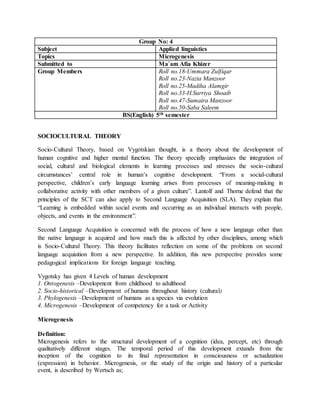
Microgenesis
- 1. Group No: 4 Subject Applied linguistics Topics Microgenesis Submitted to Ma`am Afia Khizer Group Members Roll no.18-Ummara Zulfiqar Roll no.23-Nazia Manzoor Roll no.25-Madiha Alamgir Roll no.33-H.Surriya Shoaib Roll no.47-Sumaira Manzoor Roll no.50-Saba Saleem BS(English) 5th semester SOCIOCULTURAL THEORY Socio-Cultural Theory, based on Vygotskian thought, is a theory about the development of human cognitive and higher mental function. The theory specially emphasizes the integration of social, cultural and biological elements in learning processes and stresses the socio-cultural circumstances’ central role in human’s cognitive development. “From a social-cultural perspective, children’s early language learning arises from processes of meaning-making in collaborative activity with other members of a given culture”. Lantolf and Thorne defend that the principles of the SCT can also apply to Second Language Acquisition (SLA). They explain that “Learning is embedded within social events and occurring as an individual interacts with people, objects, and events in the environment”. Second Language Acquisition is concerned with the process of how a new language other than the native language is acquired and how much this is affected by other disciplines, among which is Socio-Cultural Theory. This theory facilitates reflection on some of the problems on second language acquisition from a new perspective. In addition, this new perspective provides some pedagogical implications for foreign language teaching. Vygotsky has given 4 Levels of human development 1. Ontogenesis –Development from childhood to adulthood 2. Socio-historical –Development of humans throughout history (cultural) 3. Phylogenesis –Development of humans as a species via evolution 4. Microgenesis –Development of competency for a task or Activity Microgenesis Definition: Microgenesis refers to the structural development of a cognition (idea, percept, etc) through qualitatively different stages. The temporal period of this development extands from the inception of the cognition to its final representation in consciousness or actualization (expression) in behavior. Microgenesis, or the study of the origin and history of a particular event, is described by Wertsch as;
- 2. ‘a very short-term longitudinal study’ (Wertsch 1985: 55). Mitchell and Myles (2004: 198) describe it as; ‘a local, contextualized learning process . . . [that] can sometimes be traced visibly in the course of talk between expert and novice.’ It is precisely this conceptual duality that makes microgenetic analysis a fruitful method to investigate learning (microgenesis) as it unfolds during interaction. Microgenesis refers simultaneously to both the method and the object of study. Microgenetic or historical analysis allows us to investigate and understand a particular event (learning as an object of study). Origin: The term microgenesis was first coined by Heinz Werner (1956) as a means of providing a genetic characterization of the structure and temporal dynamics of immediate experience, and, more generally, of any psychological process (Werner, 1957; Werner & Kaplan, 1956; Werner & Kaplan, 1963). Experimental psychogenesis, devised by Werner in the 1920s, played afterwards an important role in the work of Vygotsky and Luria who further extended its field of application and gave it a historical dimension (Catán, 1986; Vygotsky, 1978; Werner, 1957, first German edition published in 1926; Werner & Kaplan, 1956). In its modern version, microgenesis offers a genetic, phenomenological alternative to the information-processing metaphor, an alternative that reunites mind and nature and restores to cognition its cultural and hermeneutic dimensions. Types of Microgenesis: Vygotsky has recognized two basic types of microgenesis: 1. The first type concerns the short term formation of a psychological process. The study of this domain requires observation of subjects’ repeated trials in a task setting. Thus one can think of it as a very short term longitudinal study. 2. The second type of microgenesis is concerned with the unfolding of an individual perceptual or conceptual act, often for the course of milliseconds. Conclusion: Vygotsky believed that principles of language learning apply to a range of different timescales. They apply to the learning that the human race has passed through over successive generations (polygenesis), as well as to the learning that the individual human infant passes through in the course of its early development (ontogenesis). For the entire human race, as well as for the individual infant, learning is first seen as social, then individual. Human beings remain capable of learning throughout their life and the local learning process for more mature individuals acquiring new knowledge or skill is viewed as essentially the same. It means that new concepts continue to be acquired through social or interactional means. This process can sometimes be traced visibly in the course of talk between expert and novice. This local, contextual learning process is called as microgenesis.
